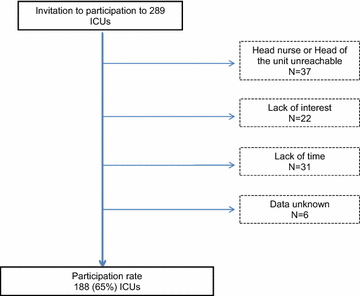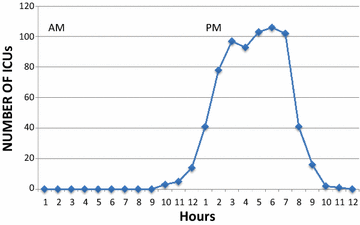Reappraisal of visiting policies and procedures of patient's family information in 188 French ICUs: a report of the Outcomerea Research Group
- PMID: 27566711
- PMCID: PMC4999564
- DOI: 10.1186/s13613-016-0185-x
Reappraisal of visiting policies and procedures of patient's family information in 188 French ICUs: a report of the Outcomerea Research Group
Abstract
Background: The relatives of intensive care unit (ICU) patients must cope with both the severity of illness of their loved one and the unfamiliar and stressful ICU environment. This hardship may lead to post-intensive care syndrome. French guidelines provide recommendations on welcoming and informing families of ICU patients. We questioned whether and how they are applied 5 years after their publication.
Methods: We conducted a large survey among French ICUs to evaluate their visiting policies and how information was provided to patient's family. A questionnaire was built up by intensivists and nurses. French ICUs were solicited, and the questionnaire was sent to all participating ICUs, for being filled in by the unit medical and/or nursing head. Data regarding the hospital and ICU characteristics, the visiting policy and procedures, and the management of family information were collected.
Results: Among the 289 French ICUs, 188 (65 %) participated. Most ICUs have a waiting room 118/188 (62.8 %) and a dedicated room for meeting the family 152/188 (80.8 %). Of the 188 ICUs, 45 (23.9 %) were opened on a 24-h-a-day basis. In the remaining ICUs, the time period allowed for visits was 4.75 ± 1.83 h (median 5 h). In ICUs where visiting restrictions were reported, open visiting was allowed for end-of-life situations in 107/143 (74.8 %). Children are allowed to visit a patient in 164/188 (87.2 %) regardless of their age in 97/164 (59.1 %) of ICUs. Families received an information leaflet in 168/188 (89.3 %). Information was provided to families through structured meetings in 149/188 (79.2 %) of ICUs at patient admission with participation of nurses and nursing assistants in 133/188 (70.4 %) and 55/188 (29.2 %), respectively. Information delivered to the family was reported in the patient chart by only 111/188 ICUs (59 %). Participation in care was infrequent.
Conclusions: Although French ICUs do not follow the consensus recommendations, slow progress exists compared to previous reports. Implementation of these recommendations is largely needed to offer better welcome and information improvement. Further studies on that topic would enable evaluating remaining obstacles and increasing caregivers' awareness, both critical for further progresses on that topic.
Keywords: Access to information; Family; Family information meeting; ICU; Information to family; Post-intensive care syndrome; Visiting policy.
Figures
References
LinkOut - more resources
Full Text Sources
Other Literature Sources




